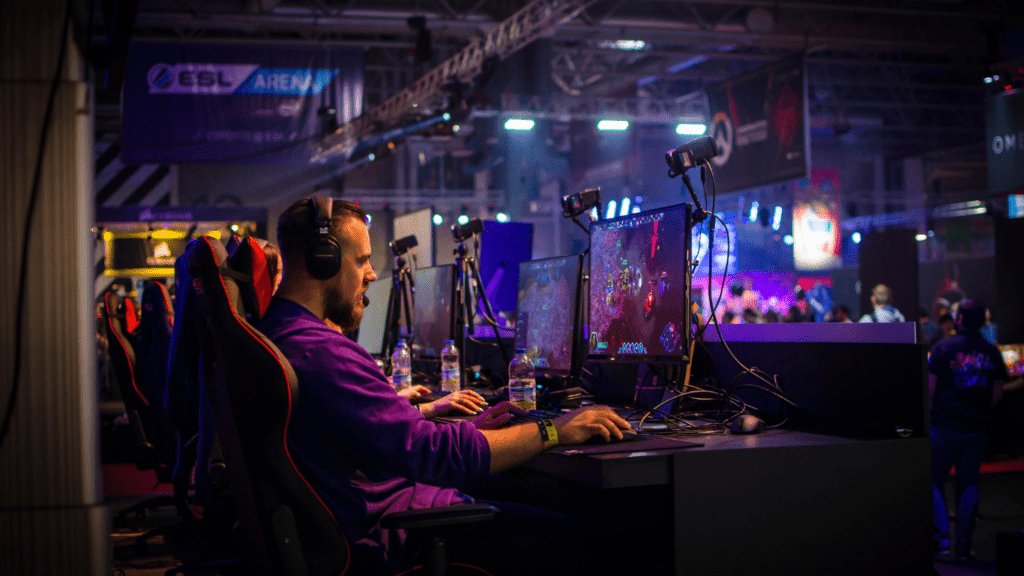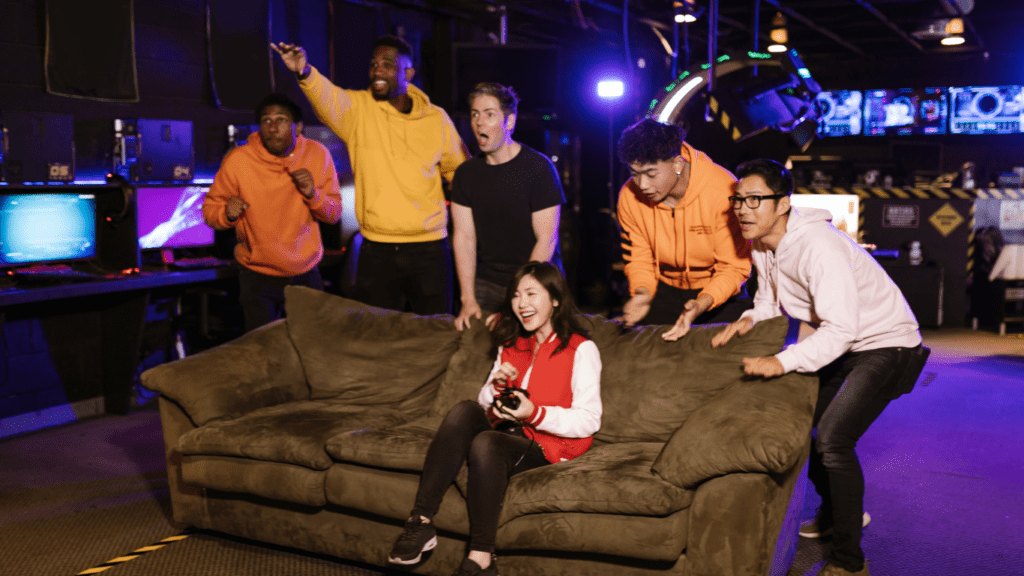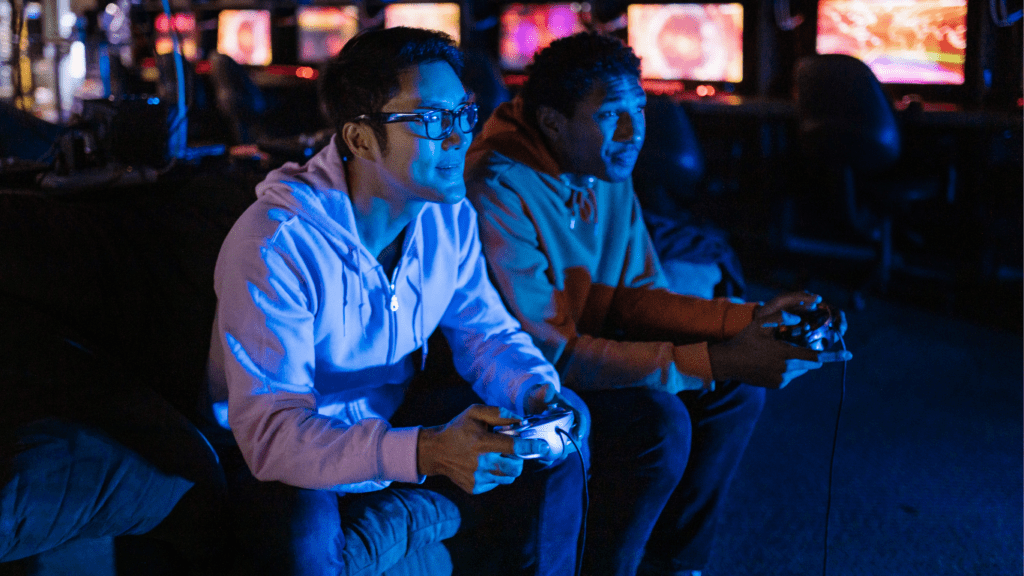Understanding Esports
Esports blends competitive gaming with professional sports elements. It continues to grow, attracting vast audiences and diverse participants.
Definition and History
Esports refers to organized, multiplayer video game competitions. These events often involve players or teams competing against each other in a variety of games. Initially, esports emerged in the 1970s with arcade game contests. The 1990s saw the rise of PC gaming tournaments, with games like “Quake” and “StarCraft” gaining popularity. By the 2000s, esports transformed into a global phenomenon, driven by technological advancements and internet accessibility.
Popular Games and Tournaments
- Several games dominate the esports landscape, each with unique gameplay and fan bases.
- League of Legends, a multiplayer online battle arena (MOBA) game, hosts the annual World Championship with millions of viewers worldwide.
- Dota 2 features the prestigious International tournament, renowned for its massive prize pool.
- First-person shooters like “Counter-Strike: Global Offensive” and “Overwatch” also hold major tournaments, showcasing intense team-based gameplay.
- Battle royale games, such as “Fortnite,” draw audiences with high-octane action and large-scale formats.
Each tournament offers players lucrative opportunities and serves as a platform to showcase skill.
Getting Started with Esports
Embarking on an esports journey requires choosing a game and mastering its mechanics. For beginners, these foundational steps pave the way to progress and success.
Choosing the Right Game
First, identify a game that aligns with your interests and skills. Popular choices, like “League of Legends” and “Counter-Strike: Global Offensive,” offer competitive scenes and vibrant communities. Consider the genre: strategy games need planning skills, while shooters demand quick reflexes. Watch professional streams and read forums to gain insight into the community and game dynamics. This research helps select a game that complements your preferences and strengths.
Understanding Game Mechanics
Mastering game mechanics is vital for success in esports. Each game has unique systems, from resource management in “StarCraft II” to precision aiming in “Fortnite.” Start by learning the basic controls and objectives. Tutorials and practice modes facilitate skill development by providing a controlled environment. Watching instructional videos and joining player communities can accelerate your learning process. Focus on refining your skills through regular practice, aiming to internalize game mechanics for effective competition.
Building Skills and Strategies
Mastering skills and developing strategies are crucial in the competitive world of esports. Skillful play and strategic thinking can make the difference between victory and defeat.
Practicing Effectively
Consistent practice is essential for improvement. I tailor practice sessions to focus on specific skills, such as aim or reaction time, to avoid stagnation. Using tools like aim trainers and practicing in-game modes enhances specific abilities. Analyzing game replays helps identify mistakes and areas for improvement. I recommend setting clear goals and maintaining a steady practice schedule to track progress.
Learning from Professionals
Observing professional players can provide valuable insights into high-level gameplay. I study their strategies, techniques, and decision-making processes.
Engaging with esports streams and tournaments enables me to analyze how pros handle complex situations. Professionals often share tips and strategies through various platforms or social media, offering guidance that I incorporate into my gameplay to elevate my skills.
Joining the Esports Community

Entering the esports community offers connections, support, and growth opportunities for newcomers. Forging relationships and engaging with others in the community extends beyond mere gameplay.
Finding Teams and Guilds
Connecting with teams and guilds remains a crucial step for involvement in esports. Platforms like:
- Discord
- GameBattles
provide ways to discover groups dedicated to various games. Research teams focusing on your chosen game—many offer structured training and friendly scrimmages. Guilds often host events where collaboration and strategic learning occur. Consider reaching out to forums and game-specific subreddits where team recruitment frequently happens.
Participating in Online Communities
Engagement in online communities facilitates personal growth and gameplay improvement. Esports forums and social media groups, such as those on Twitter or Facebook, allow interaction with seasoned players and enthusiasts. Joining Twitch streams and YouTube channels of professional gamers offers insights into advanced techniques and strategic mindsets. Actively participating in community discussions breaks barriers and cultivates a sense of belonging in the esports world.
Preparing for Competitions
Excelling in esports requires rigorous preparation and strategic planning. Competitors must focus on training schedules and coping mechanisms to manage the stress inherent in high-stakes tournaments.
Training and Scheduling
Consistency is crucial when developing a comprehensive training regimen. I designate specific hours each day for skill enhancement, ensuring a balance between practice modes and live matches. It’s vital to break training down into focused sessions to improve distinct skills, whether it’s aim accuracy in shooting games or macro strategy in MOBAs.
I also implement structured rest periods to prevent burnout, acknowledging that recovery is as significant as practice. To maintain motivation and track progress, I set short-term goals that contribute to my overarching competitive objectives.
Managing Stress and Pressure
Adopting effective stress management techniques is essential when competing under pressure. I incorporate relaxation methods such as mindfulness and breathing exercises into my routine to maintain focus and composure during matches. Visualization techniques, where I mentally rehearse scenarios before competition, also aid in reducing anxiety and boosting confidence.
In my preparation, I gather insights from psychologists specializing in performance under stress, finding value in mental resilience strategies applied by top esports athletes. Testing these strategies in practice matches equips me with the tools needed to perform optimally in actual tournaments.
Essential Tools and Equipment
Getting started in esports demands specific tools and equipment to ensure competitive gameplay. Here’s a breakdown of essential hardware and software for beginners.
Hardware Requirements
A high-performance gaming PC is crucial for smooth gaming. Look for one with a powerful GPU like the NVIDIA RTX series or AMD Radeon for optimal graphics rendering. A fast CPU, such as an Intel Core i5 or AMD Ryzen 5, supports efficient processing. Additionally, invest in at least 16GB RAM to handle modern games.
A reliable monitor enhances visual performance. Opt for a high refresh rate, around 144Hz to 240Hz, coupled with low response time to prevent lag. A comfortable gaming chair and ergonomic desk support long hours of play, reducing strain.
Quality peripherals, such as a mechanical keyboard and an accurate gaming mouse, improve response times and precision. A headset with clear audio quality also boosts in-game communication.
Software and Accessories
Updated operating systems and graphics drivers maintain functionality and performance. Consider game optimization software like NVIDIA GeForce Experience or AMD Radeon Software, which automatically configure settings for the best experience.
Communication software, such as Discord, facilitates team coordination. Additionally, streaming software like OBS Studio allows you to share gameplay, enhancing community interaction.
Accessories include a good webcam and microphone to connect authentically during streams. Capture cards are useful if you plan on streaming console games, offering high-quality video transmission.
By equipping yourself with these tools, you lay a solid foundation for your esports journey.



 Senior Sports Writer
Alfred Alder is the senior sports writer at Sprint Scoop News, bringing his extensive knowledge of fitness, training, and sports business to the forefront. With a career spanning more than a decade, Alfred specializes in delivering high-quality, engaging content that covers everything from sponsorship trends to the latest in health and nutrition for athletes. His deep understanding of the sports industry allows him to provide readers with comprehensive insights that make complex topics accessible and exciting.
Senior Sports Writer
Alfred Alder is the senior sports writer at Sprint Scoop News, bringing his extensive knowledge of fitness, training, and sports business to the forefront. With a career spanning more than a decade, Alfred specializes in delivering high-quality, engaging content that covers everything from sponsorship trends to the latest in health and nutrition for athletes. His deep understanding of the sports industry allows him to provide readers with comprehensive insights that make complex topics accessible and exciting.